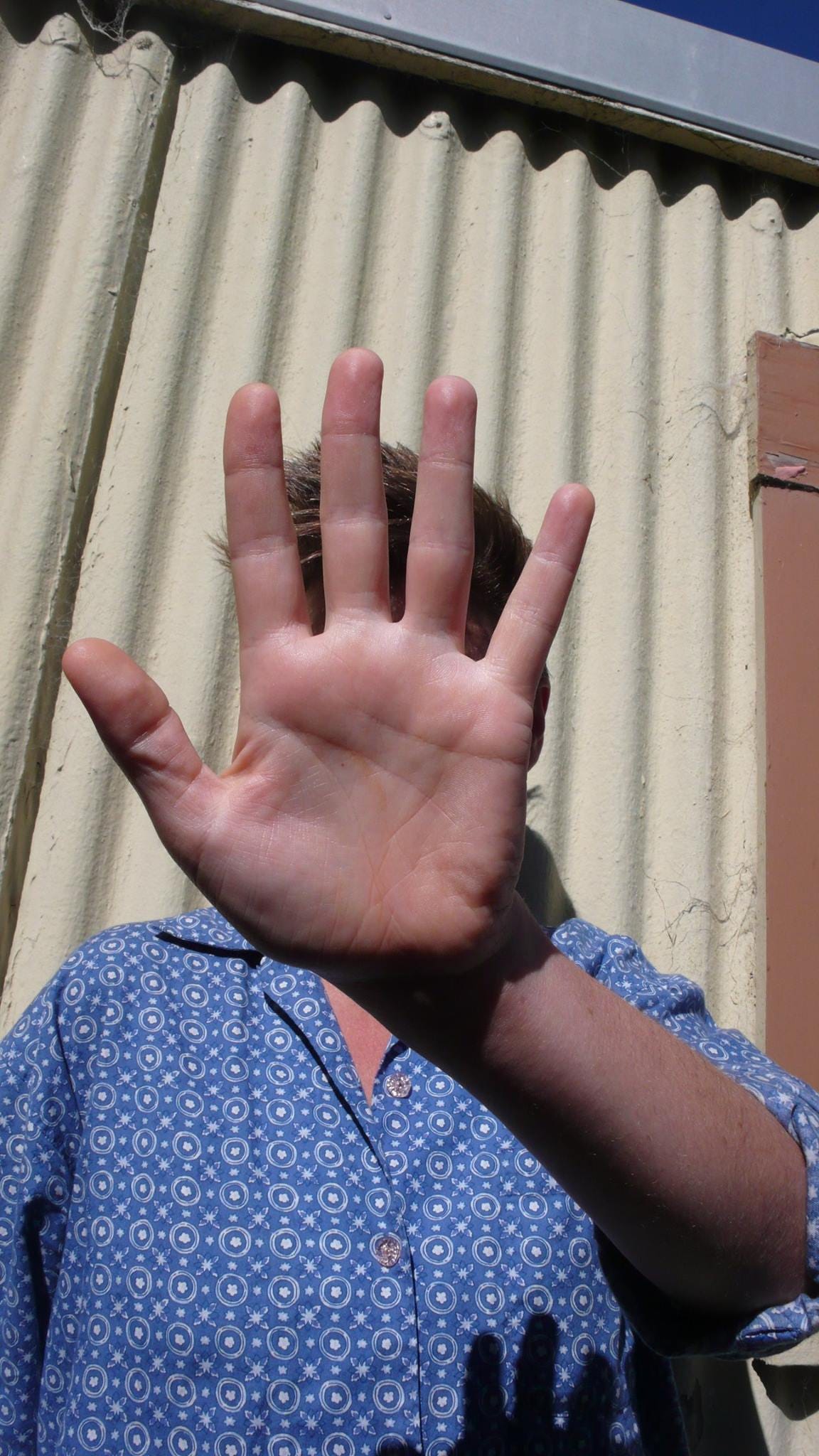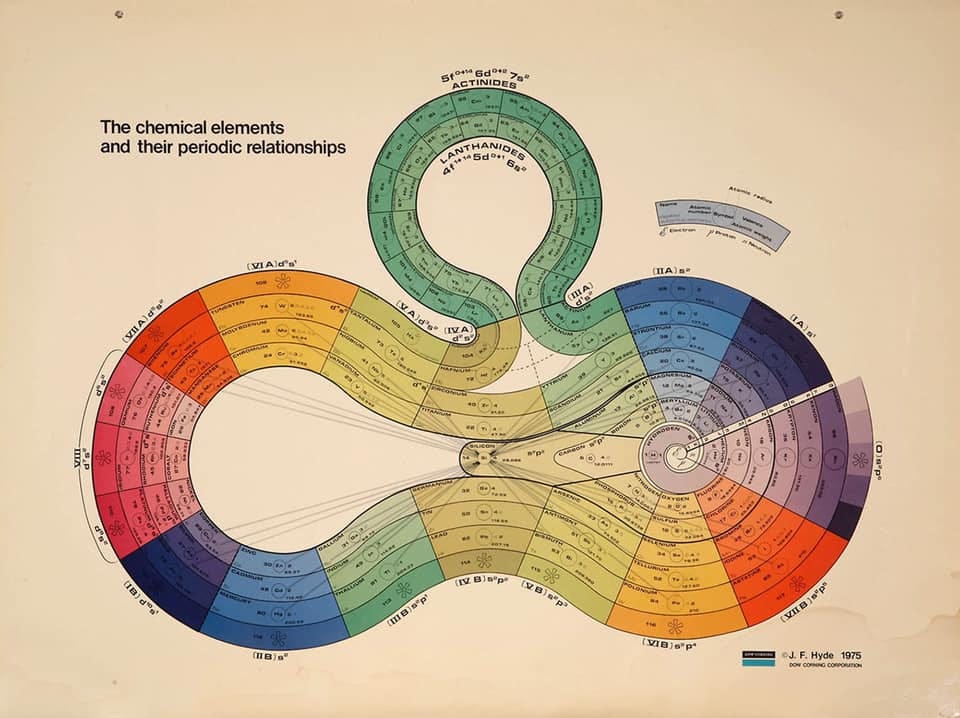Brain in a Jar
On Objectivity vs. Subjectivity While Female
Adrienne Rich in 1977, quoting Charlotte Brontë’s Jane Eyre: “I have an inward treasure born with me, which can keep me alive if all the extraneous delights should be withheld or offered only at a price I cannot afford to give."1
T. S. Eliot, Four Quartets: “Go, go, go, said the bird: human kind
Cannot bear very much reality.”
The small knife is in my right hand. I lever the blade’s spine against my left thumb-pad, where the blister has broken open and hardened into a callus. The butt-end of the wood is held in my left hand’s curled fingers, the knife’s handle in my right; the hinged tension of their leverage urges the cutting edge through. Tiny russet curls spring away, leaving small facets of grain. The virgin interior of the driftwood reveals itself. It releases a resinous scent, the ghost of its blood. How many cuts? Hundreds, thousands? A blizzard of momentary decisions flow into each other and become a liquid process. Immersion. If I pause I’ll lose my place, the shapes I’m chasing. The wood takes its own form in my hands.
I am making prentice pieces, trying to find the sweet spot between going too far and not going far enough. The only way to know is to go too far. (Unlike writing, whittling is a one-way process.) I am discovering the slight variations in cutting, the way the blade can chop, shave, or smooth. I am learning the way the curves and planes speak to each other. When I stop, time starts again, and I suddenly feel the ache in my back and hands.
Craft, long-dormant, stirs itself, shakes the leaves out of its fur, goes looking for a drink. Whence this sudden maker’s urge?
When I started writing here almost a year ago, I noticed an interesting phenomenon: I was experiencing the new form of intellectual labour as a blessed relief from what I had started disparagingly referring to as the World of Matter. When I had my exhibition last September, it felt as if I had been dragged out of the airy realms of pure thought and back down into the mud. How much harder the grunt-work of making felt, compared to the cerebral work of writing!
When I made the work for the exhibition I was working on the cheap and having to rely on other people (in particular, lacklustre budget-print-shop employees) to get the work made, to bring my beautiful conceptions into material form. (Easy, you would think— or at least possible— for a print shop to print things.)2 As I spent hours and then days, as well as many hundreds of sunk-cost-fallacy dollars, trying to coax some sort of last-minute art-miracle out of this indifferent clay, anxiety-cascades of stress and rage coursed through my veins.
It was kind of my fault, though. I’d got myself into this pickle by cutting it too fine time-wise. Ah, procrastination: bane of my life, demon familiar, shadow. The force of it took me by surprise, but the maelstrom of emotions brought on by 3D art-making was as familiar as an old pair of shoes. Pressure, panic, inaction, more pressure, more panic, more inaction, rinse and repeat. Any decision becomes a huge, blank wall of stone. Associated beliefs: Imperfect reality cannot approach the shining idea. Deeper: Inaction is better than failing. Deeper: If I fuck up I will be severely punished.
Cut to a few weeks ago. I was invited to be a guest at a middle-sized Folk Festival. Just as with the exhibition, it was a great honour to be asked, and yet— it unleashed a massive emotional shitstorm inside me. My first instinct was that agreeing to do it would consume my life with months of anxiety, but I started second-guessing. Did I just THINK I didn’t want to? Didn’t a part of me want to? Was I spinning a problem out of pure anxious contrarianism, doubling down on my doubling down (quadrupling down)? Was this in fact the good kind of challenge? How to know? The problem was, I had to make a decision based on my feelings alone. My feelings: Being onstage with hundreds of people looking at my face and body while I sing will interfere with my true vocation— being a brain in a jar.

Last week I wrote a comment on Jody Day’s piece Who is that old woman in the mirror? in response to Day noting “I often find it a bit annoying, if someone calls me brave for speaking my truth... it began when I first started writing about childlessness-not-by-choice 15 years ago, which at the time was not a topic (other than infertility) that was 'allowed' to be discussed…”
My response: “To unpack this idea of truth being 'brave' a bit further, I think it has something to do with implicit objectification. It's re-centring judgement from the outside. Likewise when people say "But you are beautiful!" in response to 'I have been having these experiences with inhabiting a mortal human form.'
Part of the problem is there is very little ground to stand on when it comes to the ISNESS of inhabiting a female body (that is, subjective experience rather than expression for the sake of others’ objectification). I have realised that part of the reason I feel so comfortable in the space of being a writer is that I get to be a mind expressing itself separate from body or face.”

It’s not correct to say I hate the world of matter; I just have a difficult, familyesque love / hate relationship with it. My first teenage art-love was photography. I carried my Pentax Spotmatic everywhere with me, into the sea, even, held carefully out of reach of the waves’ tongues. This love affair lasted for a solid decade. Yet even as I attempted to look deeper— deeper— I struggled relentlessly with what it meant to engage with the outside of things. What did it mean to make art about how things looked? I revolted against the privileging of appearance— of beauty— above interiority, hiddenness, the invisible, the occulted. From the start I was driven to make portraits. Other humans were what interested me the most. I loved it when my work could make people really see themselves, sometimes for the first time ever: a potent magic trick. Yet how was it possible to navigate consent ethically? I didn’t seem able— as other photographers seemed able— to inhabit the role of image-predator, to see everything (everybody) as mine, to shoot, to capture, to take. As Teju Cole says in his essay Restoring the Darkness:3 “When we speak of shooting with a camera, we acknowledge the kinship of photography and violence.”
And: “Among the human rights is the right to remain obscure, unseen, and dark.”
My problem with the ethical depiction of other human beings and my problem with how I am seen are two sides of the same coin: subjectivity / objectivity. These twin problems have become intensely activated with the evolution of smartphones and social media, and the attendant assumption that anything that happens in public (and much that happens in private) is up for grabs. My laboriously-crafted ethics around image-making have become as obsolete as the film camera I used. Technology has run far too fast for something as slow and complex as ethics to keep up, and the public space has become a web of sight-lines, a ceaseless mutual Panopticon.
My experience of living in the future is flavoured by constant rage at the wrongness of things, combined with an inability to meaningfully do anything about any of it. Even the possibility of removing oneself from the ubiquitous web of surveillance4 has been eroded away, seemingly without anyone noticing or caring. I know it’s a waste of energy to be angry about it, but the anger seems to occur at an instinctive level, below my conscious control.
Where did the brain-in-a-jar motif come from, anyway? It seems to have arrived in my mind fully formed. My instinct is that the origin of this image is the TV show Futurama, a cartoon set 1,000 years in the future.5 Any cameo from a currently-famous human depicts said human as a cryogenically-frozen-then-reanimated head in a jar.
I’m reading Claire Dederer’s new book Monsters: A Fan’s Dilemma. It’s about whether it’s OK to love the art of awful men, but it also ends up being about the near-impossibility of being a female genius / art monster.6
Here’s Dederer on Joni Mitchell: “I want to stress again that Mitchell is not in any sense a likable figure. When I read [Sheila Weller’s book] Girls Like Us, I was busted up and inspired by how much of a pain in the ass Mitchell seemed compared to Carly Simon and Carole King… She seemed— to me, a writer desperately in need of uncompromising female role models— committed to the role of artist. Unafraid of being perceived as pretentious. Utterly without a need to be liked— loved, yes, liked no…
Is it an accident that Mitchell was also the only, only, only real female titan of the great rock era?
She did what a great artist does: vigorously, aggressively protected her ability to make something vulnerable and tender… Joni Mitchell was an asshole on behalf of her own vulnerability.”
Typing out this passage and thinking about Dederer’s image of Mitchell’s hard carapace sheltering her tender interior, I am struck by the following parallel:
Vulnerable = Brain
Assholery = Jar
Sung words come from the mouth, borne on warm breath; written words come from the fingers— delivered later, a letter— hot thought set into cool form.
My subjective experience is intertwined with my gift of art. To speak with authority I must stand in my own truth. (That’s literally what being an artist is: honing one’s own point of view.) I love lively talk, the spark of mind against mind; I dislike lying; I know what I know. My truth-of-experience— which mostly seems to me fairly normal and logical— has often been mirrored back to me as if it were a Molotov cocktail, a threatening violent substance. To insist upon my point of view can mean an argument.
I possess the gift of meaning-making— and I’ve worked on it a lot, for many thousands of hours— yet for most of my life (and it could easily, easily have been for all of my life) I have submitted to other people’s stories of me in exchange for some kind of precarious safety, smothering my own true takes to make room, alienating myself from myself. Of course, it was me who did that, who submitted; I bit my own tongue because I wanted to be liked / loved, because I was tired of fighting.
I understand that my difficulty with embodiment is a problem of control. I understand that I cannot control how people perceive me, or how they behave. It’s another one of those waste-of-energy problems. I feel, though, that because of the accident of birth that placed me (by me here I mean my brain, my interior thinking self) into a female body, I’ve been forced again and again out of subjecthood and into objecthood— a kind of violence to my soul, an erasure of personness by means of a thousand abrasions and rubbings-out.7 These cuts can be subtle or overt, but they can be known by a particular poisoned feeling. I remember James saying once, when I had been insulted in this specifically dehumanising way: “It’s a question of mana.”8
Perhaps my enduring need to be seen primarily as a thinking mind, independent of my embodied self, is an attempt to smash and grab my subjectivity back.
I know there’s nothing unique or even unusual about any of this. Dehumanisation is an experience common to many, many people. Inoculated with the spores of capitalist patriarchy the minute we are born; yet the flame of defiant soul-self cannot be extinguished, quite. It goes on stubbornly burning even when it is buried under dirt.
In the Recycle Boutique the music is going Bitches gon be bitches but I love them hoes. That’s fake shit bitch. Bitches gon be bitches. This kind of soundtrack is common in shops staffed by The Youth. The young dude with the pencil moustache behind the counter is rapping along. I try on two cotton dresses, one with a pattern of autumn leaves and one with a houseplant print. Neither sit right. Bitches. Bitches. I’m simmering, but I swallow it. I want to say You are alienating half of your potential customers; but I know that’s the point. It’s a litmus test of oldness, the opposite of train stations playing classical music to drive away young thugs.
A central paradox: I am extremely chary of revelation on other people’s terms, yet I wish to reveal other people on my terms. I am driven to guard my own subjectivity, yet part of that subjectivity concerns how I see others. My instinct is that somehow my prickliness keeps me ethical.
Philip Traylen: “Somewhere between the twin poles of making wrong claims about someone and having wrong claims made about you you must make your path. But above all you must always pay your respects to these activities, to the primordial interpretative error on which reality has been built. You must bow, not because it is perfect and beautiful but because it is an enormous, ever-expanding mistake, of which you are the outer limit…
The writer can tolerate neither the truth-founding ur-claim of the face nor its false secondary claims. Writing… is nothing but the exit from the face…”
In December, when I read Lauren Elkin’s Art Monsters: Unruly Bodies in Feminist Art, I was struck by how many of the female artists / writers Elkin references died young. Insomniac because of the short Midsummer nights, I decanted the early-dead into my journal at 3 a.m.
Sylvia Plath: suicide by gas, aged 30.
Anne Sexton: suicide by gas, aged 45.
Virginia Woolf: suicide by drowning, aged 59.
Kathy Acker: breast cancer, aged 50.
Hannah Wilke: lymphoma, aged 52.
Eva Hesse: brain tumour, aged 34.
Halen Chadwick: myocarditis, aged 42.
Eve Kosofsky Sedgwick: breast cancer, aged 58.
Audre Lorde: breast cancer / liver cancer, aged 58.
Theresa Hak Kyung Cha: raped and murdered, aged 31.
Jo Spence: breast cancer, aged 58.
Ana Mendieta: murdered by husband, aged 36. (She fell from their apartment window: he was acquitted of her murder.)9
Alix Cléo Roubaud: pulmonary embolism, aged 32.
None of these thinkers and makers made 60.10 Their deaths are not the primary subject of the book— the subject is their work; their premature deaths are just a cold fact. It becomes difficult to consider their work objectively, once they have died this way. Three of these women died by suicide. Two were murdered. (How is it possible now to look at Mendieta’s Siluetas with a neutral gaze, when they prefigure her death so closely?)
Why is is so dangerous to be a female artist?11 And why do we do it anyway? Making good art requires truth. Truth is dangerous. Art is magic. To be a woman and to be doing true powerful magic is dangerous.
Muriel Rukeyser, of Käthe Kollwitz:
"What would happen if one woman told the truth about
her life?
The world would split open"
I can see it now, the way the writing path tricks a person into greater revelation. It happens step by step. Just a little bit further... Come on, what’s around that corner? I’m compelled to continue by the fitness of Right Vocation; by the nuts-and-bolts pleasure of the craft; but also— specifically— by the thrill of being seen in a way that feels more or less correct. Also (and this is not a small thing) here on Substack I see many other people crafting beautiful variations on what I’m doing and what I want to do.12 It’s a hall of mirrors, in a good way.
To construct a body of work that is publicly visible is to develop a relationship with that mysterious beast, the Reader. A strange and singular relationship: the Reader is both nobody and everybody. The technique people sometimes suggest— Pretend you are writing to so-and-so (i.e. someone known) doesn’t work for me. I’m too literal-minded, I can’t trick myself that way.13 Who am I writing for / to, then? On the one hand, I’m writing for myself, to work things out, and if other people find something noteworthy in what I write, then, OK. On the other hand, I’ve written to myself for twenty-five years. The new element here is you.
It turns out there’s something electric about having an audience. Some people love the stage, some people love the page. When I’m in the middle of a sentence, searching for the exact right word, my soul is so happy. Truly, I feel almost guilty at my writer’s privilege, at how sweet this work feels, superstitiously waiting for the axe to fall. Is this… allowed? Can I mash jokes into the bitter brew, can I knit glittery footnotes into the tapestry of my ramble? Yes. I can. This doesn’t pass through anybody else’s hands but mine.
Thomas J. Bevan put it this way in his meta-essay On Essays: “The level of freedom is absolute, sometimes dizzyingly so. The form is endlessly malleable and as far as I can see (and as far as I am concerned) you can write about whatever you want, at whatever length, in whatever form or sequence you please. You can write calculated works that offer up key points and takeaways for the reader to underline or jot down in a notebook, but you don’t have to offer this. You don’t have to do anything in my opinion other than entertain the reader and not waste their time. It’s that simple, and that difficult.”
The strange thing is that as I sit and write for hours each day— as I work my way back to the centre of my Self— my body asserts itself in new ways. Desire to move,14 desire to do things with my hands. Urge to touch soil and leaves; to lift my eyes to the place where the sea meets the clouds; to enact change in my environment; to tutu, to tinker, to play. Craft, haptic knowledge long-dormant, stirs to life in my hands. I re-wield a pencil, a needle, a knife. Humble tools all, small. Things I can pick up and put down at will.
Morning-time, and I’m trying to stroke this essay into shape when I get a message: Dolphins in the Bay. I walk down. There are people lining the lip of the carpark, the edge of the water. Overcast sky and a still sea make the dolphins dark silhouettes against the silver of the surface, their slender fins splitting it as they breathe. They are focussed, team-working. There are maybe thirty of them, though it’s hard to tell. I’ve never seen them so close to shore, so close I can see the olive stripe on their sides. I see Kieran and Chrissie and walk down to them. All the other humans suddenly do the flock of seagulls— one takes flight, and then a few more, and then they all fly away at once— because the dolphins have moved out to the mouth of the Bay and the sightseers think they’ve gone. The locals stay put, knowing they’ll come back in— the pods move in big purposeful sweeps around the Bay when they’re fish-herding, sometimes for hours.
Kieran tells me he’s just been reading my ‘stack, that it’s good, that my voice is distinctive. I say that’s a thing it’s impossible to see from the inside— voice— and that I’m working on a new piece, about subjectivity vs. objectivity. I say this (pointing to forehead) vs this. As I indicate my body, I remember the misanthropic robot Bender in Futurama, with his derogatory names for humans. Meat-sack. Flesh-tube.
They tell me about the book they’re making, to honour the end of their 20-year band project, mr sterile Assembly. Chrissie says that the same photo means one thing to her, another to Kieran. Rolling art-talk, then, about copyright, creativity, the structuring of ideas, the patterns that emerge. (Is the page gendered? Is it better to listen to Merlin Sheldrake, or read him? Is looking at words really looking at pictures, since the letters trace their lineage from ideograms / images?) I talk about Alan Moore’s Ideaspace, as described by John Higgs in his book about The KLF. They tell me how an artist can be a scenius—15 a term coined by Brian Eno to describe the creative egregore— rather than a genius, who is often merely the most visible fungus growing out of the humus of an extensive art-ecosystem.
The dolphins are coming in to shore again, right by where we are standing at the very edge of the waves, and we pause our talk and watch. I hear their popped breaths. A tiny baby throws itself out of the water in an endearingly clumsy way, first efforts at dolphining, like a toddler learning to walk. Its small fin reappears at the side of its Mother’s. There are a few babies with the group, and they must keep up with the pace: they can’t be carried like human babies, though maybe there’s a slipstream effect from sticking so close.
Orange in the corner of my eye. Five Buddhist monks have come down from the monastery and are standing in the carpark, watching the dolphins. Seeing them inside the same moment like that, I see that they are the same, the dolphins and the monks: inhabiting the present moment, carrying nothing, embodying joy. Chrissie says how bright their robes look, against the grey day— the grey of stone and concrete, the silver of cloud and sea. One wears a more muted ochre but most of their robes are intensely saturated. I say that they look like nasturtiums, that same hyper-real colour. Walking home, I pass them by as they’re getting into their van. I smile at them and they smile back, fully-open under their woolly hats, their smiles radiant as suns.
The context: Mr Rochester— disguised as a fortune-teller— is reading Jane’s face. “I see no enemy to a fortunate issue but in the brow; and that brow professes to say,—‘I can live alone, if self-respect, and circumstances require me so to do. I need not sell my soul to buy bliss. I have an inward treasure born with me, which can keep me alive if all extraneous delights should be withheld, or offered only at a price I cannot afford to give.’
The place was so terrible that I felt sorry for the hapless wage-slaves, who must have had to deal with angry customers like me all day long.
The essay is a response to a colonial-era photograph of an Ijebu King at the centre of a large crowd. (The Ijebu are a tribe Cole belongs to— I want to say his iwi.) The King has the bead curtain hanging from his crown parted, so that his face is visible— an extreme violation of taboo.
Opting out of the Panopticon, as it were
My guess was ‘100 years in the future’, which says something about the rate of techvolution since the show premiered in 1999.
The oft-repeated phrase comes from Jenny Offill’s 2014 novel Department of Speculation: “My plan was to never get married. I was going to be an art monster instead. Women almost never become art monsters because art monsters only concern themselves with art, never mundane things. Nabokov didn't even fold his own umbrella. Vera licked his stamps for him.”
The weird thing about dehumanisation is the way that often people don’t notice or care that they are doing it. As Nicola Griffiths put it last week, in the British Library talk The Realms of Ursula K. Le Guin, “Are women human?”
I have to comb passages like this again and again, removing the prevarications to come to what I want to say. My difficulty with the plain words I, me, my, mine; the way I am constantly tempted to take a step back from ownership of experience by using neutral language like one, we, people; the way the cautious part of myself will not stop going on about how the cat can’t be put back in the bag, and do I really want to tell everyone that?; the way that writing anywhere near the topic of being female feels like handling gelignite, in spite of the fact that I want to write about what is most important and true; these are enculturations, learned defences.
Dederer: “We is cheap. We is an escape hatch. We is a way of simultaneously sloughing off personal responsibility and taking on the mantle of easy authority… We is make-believe… When I say we I mean I. I mean you.”
A word that is hard to translate— often translated as pride or power, but it also refers to prestige / status / standing / dignity / face as in to lose face. It has to do with respect / disrespect: in the old days a slight to someone’s mana could be cause for duel or war. As well as accruing through deeds, it is also a kind of inherent selfhood. (Any translation errors are mine— I am by no means fluent.)
Mana wāhine specifically refers to women’s mana: here Stacy Morrison speaks to the overlaps and differences between feminism and mana wāhine. Mana wāhine embedded in Māori world view
More on Mendieta here: Podcast: Death of an Artist
I notice that my age— mid-40s— is right in the middle of this distribution.
The tendency to early death can probably be partially explained by precarity and poverty. Many of these artists lived in the U.S.A., where poor people die from being poor because healthcare is a luxury accorded only to the rich. Another possible explanation might be that by making oneself a social outcast, one removes access to relational safety nets. But I also think there is an existential truth expressed in this ruthless statistic. Honest expression of taboo truths while female is— sometimes— punishable by death. (Is it— sometimes— the cold breath of the death-fate that drives the urgency of the work?)
Although Substack seems to have me pinned as a fan of inspirational woo, which I’m absolutely not. The ‘stacks I love the most are the ones which are fruiting bodies of the writer’s lifelong weirdohood. (*koff* Tom Cox)
Tip of the Wizard hat to Enrique Enriquez though, without whom etc. A year of daily poetic correspondence with this elegant Wizard of New York convinced me of the potentiality of communion with strangers, which in turn gave me the confidence to start writing here. For all his benignity he is a person of strong tastes, so that sometimes still when I’m writing I think ‘Enrique would like this,’ or ‘Enrique would not like that.’
I have a green shoot of an idea to get hold of a treadmill so I can walk as I work— this is the method recommended by Neal Stephenson in his essay Arsebestos. My body knows that sitting still is not the optimal way to think.
Kevin Kelly: Scenius, or Communal Genius








I finished this essay and picked up Angela Carter's book of essays Expletives Deleted, opening it at random. It opened to the middle of her essay about Jane Eyre, which I hadn't read. Carter: "Charlotte died in 1855, at thirty-nine years old... If she had not died so young, the course of English fiction would have been utterly different."
Charlotte outlived her Mother, who died when she was five; her two elder sisters, who died while they were at school; and her siblings Branwell, Emily, and Anne, who all died of tuberculosis between September 1848 and May 1849. Carter: "Few lives have been more unrelievedly tragic."
This old fragment of journal popped up elsewhere: "26 Sept 2013: Everyone on the bus plugged into their electronic devices (their masters- their portals-) as usual & me, no different in the matter of compulsion, plugged into my book. Except that they are taking in & I am putting out. I've been thinking lots on this subject lately, with GCSB, TICS, etc. [Government Communications Security Bureau, Telecommunications (Interception Capability and Security)- a Bill before Parliament] Thinking about the implications of the direction of personal tech- specifically, the omnipresence, addictiveness, & the takeover of parts of the human mind. There is the argument that when the Greeks started writing, everyone said memory would die-
What I'm wondering about it the shape of a robust mind. That is, I think functions of the mind, the individual('s) way of thinking- & necessarily the body & heart too, since it's all entwined- are subtle & complex in their relationships. So to take away one function- memory say, the need & thus ability, habit- of remembering facts (a function which has been outsourced to a giant corporate, Google)- how do the ripples flow from that loss? Which other subtle functions are weakened?
Or this: the ability to be present. Presence which is viewed by our action-obsessed culture (world culture, homogenous) as useless idleness. Engagement, direct, unmediated, with one's own world. These things are threatened, given up, for the small change of entertainment, diversion.
And it's like the rise of digital photography- it doesn't matter what the individual does, it's a matter of collective change. So a person can resist Facebook, not go on it, go to a party, be photographed & put on FB & identified, by someone without a second thought. Because this BEHAVIOUR, the assumed ownership of someone else's very image, is the outcome of the march of technology...
Yesterday I watched J.'s avatar, in the game GTA IV, beating a lifeless corpse with a hammer."